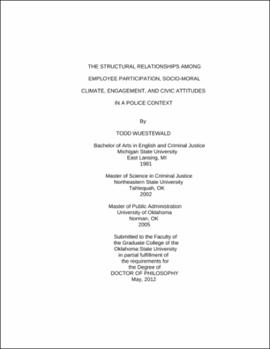| dc.contributor.advisor | Self, Mary Jo | |
| dc.contributor.advisor | Song, Jihoon | |
| dc.contributor.author | Wuestewald, Todd Cameron | |
| dc.date.accessioned | 2013-11-26T08:35:03Z | |
| dc.date.available | 2013-11-26T08:35:03Z | |
| dc.date.issued | 2012-05 | |
| dc.identifier.uri | https://hdl.handle.net/11244/7639 | |
| dc.description.abstract | Scope and Method of Study: Little is known about the degree of employee participation in organizational decision-making that currently exists in American policing or what the linkages may be to other workforce variables. The general approach of the study involved a quantitative-oriented empirical multivariate analysis to assess whether involvement of police employees in organizational decision-making has an effect on their perceptions of organizational climate, sense of work engagement, and their civic attitudes. An online survey questionnaire was administered to 1,891 police employees in 15 law enforcement agencies in 10 states. | |
| dc.description.abstract | Findings and Conclusions: Police organizations are generally considered to be highly autocratic and hierarchical. However, in comparing the police data with data gathered in recent studies of private enterprises in Europe (Weber et al., 2008; 2009), the police organizations were determined not to be strictly hierarchical. Based on the Weber et al. typology, police employee participation fell between traditional hierarchical organizations that exhibit little employee participation and social partnerships, which exhibit some employee participation at the tactical decision-making level. | |
| dc.description.abstract | Correlation coefficients, multiple linear regression and structural equation modeling revealed significant influential relationships between the variables. Through direct and indirect effects, the independent (exogenous) variable employee participation significantly contributed to socio-moral climate, employee engagement, and civic attitudes. Path analysis, Sobel tests, and SEM effects decomposition suggested a multiple mediator model in which socio-moral climate and engagement partially mediate the effects among the variables. Goodness-of-fit indices indicate the study's hypothesized model fits the data with a minimum of error. The main path of the research model suggests that employee participation enhances organizational climate, which contributes to employee engagement, which in turn contributes to positive civic attitudes. | |
| dc.format | application/pdf | |
| dc.language | en_US | |
| dc.rights | Copyright is held by the author who has granted the Oklahoma State University Library the non-exclusive right to share this material in its institutional repository. Contact Digital Library Services at lib-dls@okstate.edu or 405-744-9161 for the permission policy on the use, reproduction or distribution of this material. | |
| dc.title | Structural relationships among employee participation, socio-moral climate, engagement, and civic attitudes in a police context | |
| dc.contributor.committeeMember | Ausburn, Lynna | |
| dc.contributor.committeeMember | Kutz, Mary | |
| osu.filename | Wuestewald_okstate_0664D_11955.pdf | |
| osu.accesstype | Open Access | |
| dc.type.genre | Dissertation | |
| dc.type.material | Text | |
| thesis.degree.discipline | Education | |
| thesis.degree.grantor | Oklahoma State University | |
